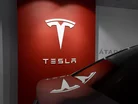Is Tesla ready for a turbulent year in the EV industry?

The electric vehicle (EV) discussion in 2022 was all about growth, innovation, and sustainable transformation, but there could be a new focus for the industry, and one of its leading occupants may be preparing for a turbulent year ahead.
Many were surprised by the efforts of Tesla’s CEO, Elon Musk, to acquire the social media platform Twitter, and there is also speculation as to whether the Tesla founder is still intent on fulfilling his vision—like many other CEOs—for a more sustainable future.
Tesla shares fall in the wake of reduced EV deliveries
Despite the hype surrounding the industry and the company’s ability to produce more cars than ever before—all thanks to its gigafactory in Texas, US—it would seem the company could slip into a difficult period as it not only experienced a reduction in sales over during the latter end of 2022, but also disappointed customers in Korea.
The immediate concern is Twitter, more importantly Musk’s diverted attention from the high-performing automotive brand to the social media platform. The Tesla CEO sold his US$3.6bn share of Tesla back in December, around about the same period in which Tesla fell shy of its expected EV delivery targets. Many have been led to the assumption that Musk is diverting his gaze to Twitter and leaving Tesla’s value to fall in a critical period of EV rollout across the US—in fact, globally.
Tesla shares fell by 65% in 2022, which marks the company’s worst performance since it went public in 2010, which is due to shareholder concerns of Musk’s commitment to the cause.
Ultimately, turning his attention to Twitter means Tesla is susceptible to the overtake from the likes of Ford and General Motors (GM), as well as some of the main pure-play EV competitors BYD, NIO, Rivian, and Lucid Motors.
Range clarity is critical in a competitive EV market
The EV market is becoming more competitive for multiple reasons: advancing technologies put automotive manufacturers on par when it comes to range; charging; and digital capabilities, the cost of charging an EV is becoming one of the main differentiators as they reach parity with fossil-fuel-powered vehicles, and supply limitations like batteries are in play despite significant growth of the segment.
As the competitive advantage is dictated by various forces and market entry becomes much more achievable, the major players in the industry must look towards the customer experience. Organisations must pay attention to all aspects of their products and, as temperatures change in the winter, Tesla has unfortunately plucked out a critical point to focus on as the weather changes—range difference.
As can be expected with any vehicle, the performance varies slightly in different conditions. In particular, when the snow hits, EV drivers must consider various factors—which were highlighted by the leading vehicle charging provider, ChargePoint.
This could be one of the main priorities for automotive firms over the next few months that could have repercussions for the future. EV companies are also likely to focus on driving down the time to charge a vehicle as well as the cost of doing so.

